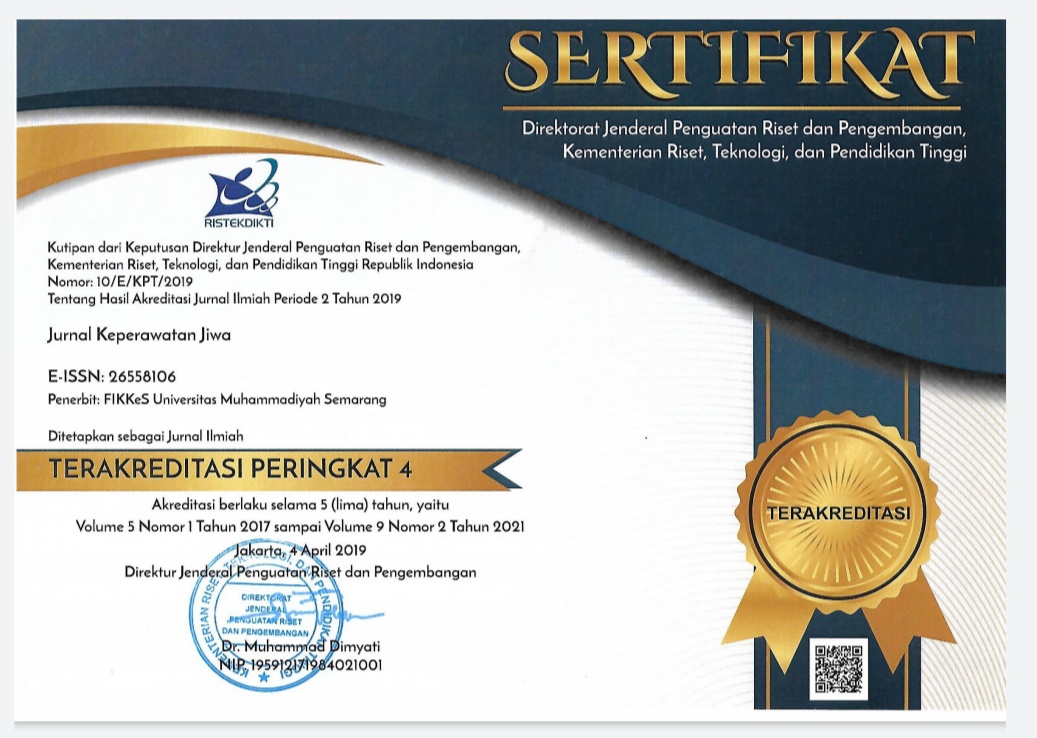Dampak Internet Gaming Disorder terhadap Status Kognitif dan Perilaku Psikopatologis
(1)
(2)
(*) Corresponding Author
Abstract
Internet Gaming Disorder atau IGD merupakan suatu fenomena yang muncul akibat dari ketidakmampuan mengontrol penggunaan internet dan video games dan sangat popular saat ini. Sejak tahun 2012, lebih dari 1 miliyar orang memainkan internet atau video games. Saat ini IGD sudah resmi dimasukkan sebagai gangguan dalam sistem diagnostik umum (DSM-5). Penelitian ini bertujuan untuk menganalisis gambaran perilaku remaja dan gangguan status kognitif, seperti hambatan aktivitas, gangguan tidur, dan kestabilan emosi. Metode dilakukan dengan menggunakan review artikel dari tahun 2009-2019 yang menggunakan 2 kelompok percobaan, diantara kelompok kontrol dan kelompok pasien pengidap internet gaming disorder. Kedua kelompok tersebut dilakukan pemeriksaan status kognitif dan gambaran perilaku menggunakan kuosioner dan wawancara. Hasil berbagai penelitian yang dilakukan menunjukkan pengaruh yang kuat antara IGD dan gangguan status kognitif, emosi serta perilaku. Simpulan penelitian adalah terdapat pengaruh antara IGD dengan perilaku psikopatologis seperti interpersonal sensitivity, depresi, kecemasan, paranoid, dan gangguan tidur serta berdampak pada penurunan gangguan fungsi kognitif, terutama pada domain atensi.
Kata kunci : internet gaming disorder, status kognitif, perilaku psikopatologi
THE IMPACT OF INTERNET GAMING DISORDER TO COGNITIVE STATUS AND PSYCHOPATHOLOGICAL BEHAVIOR
ABSTRACT
Internet Gaming Disorder is a phenomenon that arises due to inability to control the use of internet and video games, and has become a topic very popular. Since 2012, more than 1 billion people have played interned or video games. Internet Gaming Disorder officialy included in the third section of the latest (fifth) edition of the Diagnostic and Statistical Manual for Mental Disorders (DSM-5). This study aims to analyze adolescent’s behavior, cognitive status disorder, such as activity barriers, sleep disorder, and emotional stability. The method is analyzing the articles from 2009-2019 that used 2 experimental groups, between the control group and the IGD group. Both groups were examined cognitive status and behavioral description using questionnaires and interview. The result of various studies showed a strong correlation between IGD and cognitive status, emotional and behavior. The conclusion of the study, that there is a correlation between IGD with psychopathological behavior such as interpersonal sensitivity, depression, anxiety, paranoid, and sleep disturbance, experience disorder of cognitive impairment, especially in the attention domain.
Keywords : internet gaming disorder, cognitive status, psychopathological behavior
Keywords
Full Text:
PDFReferences
American Psychiatric Association. 2013. Diagnostic and Statistical Manual of Mental Disorders, Fifth Edition. London: American Psychiatric Publishing Beranuy, M., Carbonell, X., & Mark, D. G. A Qualitative Analysis of Online Gaming Addicts in Treatment. Int J Ment Health Addiction, 11, 149–161
Charlton, J. P., & Danforth, D. W. 2010. Validating the distinction between computer addiction and engagement: online game playing and personality. Behaviour & Information Technology, 29(6), 601-613.
Delfabro & Grifiths, MD. 2010. Cognitive Behavior Therapy For Problematic Video Game Players: Conceptual Considerations And Practice Issues. Journal Of Cybertherapy And Rehabilitation.
Dickey, M. D. 2011. World of Warcraftand the impact of game culture andplayin an undergraduate game design course. Computers & Education, 56, 200-209.
Griffiths & Kuss. 2009. Diagnosis And Management Of Video Games Addiction. United Kingdom : Notthingham Trent University
Khazaal, Yazeer, et al. 2012. Cognitive Behavioral Treatments for Internet Addiction. The Open Addiction Journal, Vol. 5: 30-35
King, D. L., & Delfabbro, P. H. 2014. The cognitive psychology of Internet gaming disorder. Clinical Psychology Review, 34(4), 298–308. doi:10.1016/j.cpr.2014.03.006
King, P. H., & Delfabbro, P. 2019. An Introduction to Gaming and IGD. In P. H. King, P. H. Delfabbro, D. King, & P. Delfabbro (Eds.), Internet Gaming Disorder: Theory, Treatment, and Prevention (pp. 1-21). London: Academic Press.
Kuss DJ, Pontes HM and Griffiths MD. 2018. Neurobiological Correlates in Internet Gaming Disorder: A Systematic Literature Review. Front. Psychiatry 9:166. doi: 10.3389/fpsyt.2018.00166
Lee, J.E. 2011. A Case Study Of Internet Game Addiction. Journal Of Addiction Nursing. 22 : 208-213
Malaby, T. M. 2012. Our Presen Misfortune: Games and the Postbureaucratic Colonization of Contingency. Social Analysis, 56(2), 103116.
Medikanto, Alfi. 2019. Analisis Gangguan Status Kognitif Penderita Internet Gaming Disorder Pada Siswa SMP Di Pedesaan Cangkringan. Yogyakarta: Universitas Gadjah Mada.
Mohammad, Haekal. 2017. Hubungan Intensitas Bermain Game Online Terhadap Terjadinya Stres, Depresi, Social Phobia, Gangguan Tidur Serta Perilaku Agresif. Medan: USU
Tuappatinaja, dkk. 2013. Cognitive Behavior Approach. Workshop : USU
Torres-Rodríguez, A., Griffiths, M. D., Carbonell, X., & Oberst, U. 2018. Internet gaming disorder in adolescence: Psychological characteristics of a clinical sample. Journal of Behavioral Addictions, 7(3), 707–718. doi:10.1556/2006.7.2018.75
Young, Kimberley S., & de Abreu, Chistiano Nabuco. 2011. Internet Addiction: A Handbook and Guide to Evaluation and Treatment. Hoboken, New Jersey: John Wiley & Sons, Inc.
Article Metrics
Abstract view : 4949 timesPDF - 1070 times
DOI: https://doi.org/10.26714/jkj.7.3.2019.333-336
Refbacks
- There are currently no refbacks.
Statcounter
PPNI Univ. Muhammadiyah Semarang
Jl. Kedungmundu Raya No. 18 Semarang Gedung NRC University of Muhammadiyah Semarang
Phone: 02476740287
Fax: 02476740287
Email: jurkep.jiwa@gmail.com
This work is licensed under a Creative Commons Attribution 4.0 International License.


